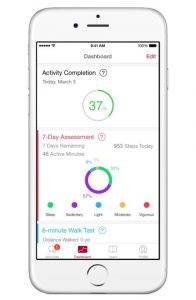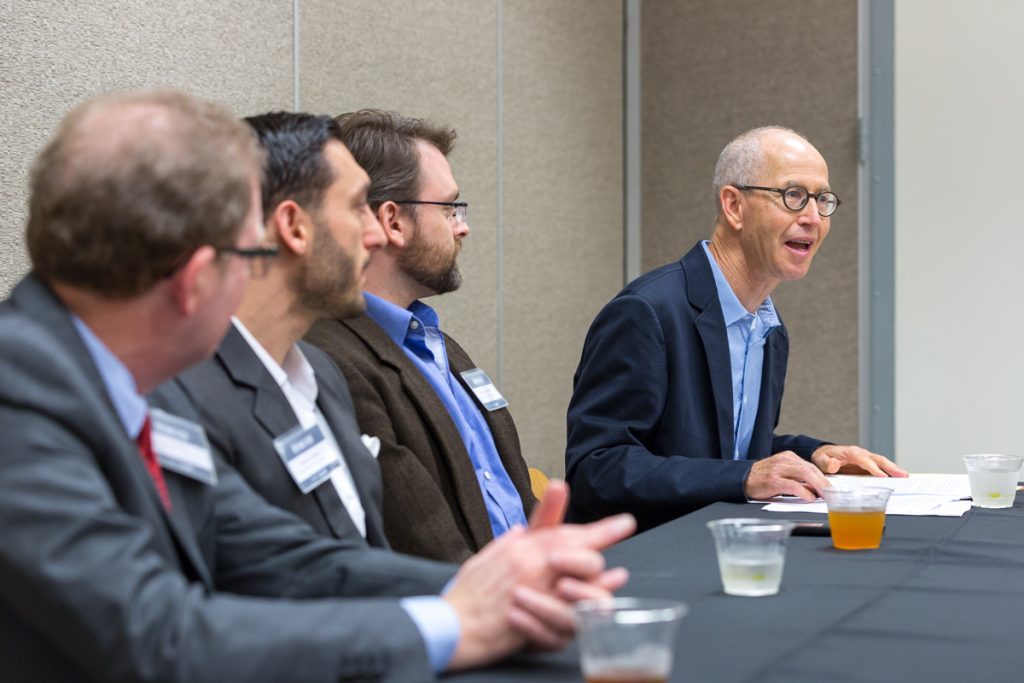Welcome to the future of healthcare, when startups in the field are in the market for the same technologists as Facebook and Pinterest, machine learning aids in drug discovery, and Big Brother will need more of a bedside manner.
Members of the Stanford community joined health-tech entrepreneurs for a panel discussion titled “Precision Health: The Future of Healthcare” during a daylong series of events held on campus recently to explore and celebrate how technology and innovation will shape the future of our world.
“Anything is possible, at least if you can write an app for it,” said Dr. Lloyd Minor, dean of the Stanford School of Medicine. He pointed to MyHeart Counts, an app that the school launched last spring that allows users to contribute to a study of human heart health, while learning about the health of their own ticker.

(Image courtesy of Stanford Medicine)
Minor also mentioned the ongoing collaboration between the school, Google and Duke University to conduct longitudinal studies aimed at understanding the molecular markers that are key to health and the changes in those biomarkers that may lead to disease.
“Too much of healthcare is about sick care,” said Minor, echoing others on the panel.
Dr. Cameron Sepah, medical director at Omada Health, talked about how his startup sits directly at the intersection of science, technology and design. A trained physician on faculty at UCSF Medical School, Sepah described how Omada combines access to health coaches, the power of social media, metrics tracking and engaging software design to promote sustained behavioral change.
Every week, tens of millions of Americans cannot get into a doctor’s office. And yet, more of us are dying today from preventable diseases – such as Type 2 diabetes and obesity – than from infectious diseases. Together, those two trends present the challenge and the opportunity, Sepah said.
In terms of profitability, Sepah explained that Omada makes no money unless its patients show positive health results. Fellow panelist Abraham Heifets, CEO of drug-development research firm Atomwise, said the same holds true at his startup: If its predictive models – fueled by the latest advancements in artificial intelligence and machine learning – don’t lead to drug discovery by the scientists and pharmaceuticals it serves, Atomwise doesn’t see a cent.
As a doctoral candidate at the University of Toronto, Heifets created one of the largest public databases of patented chemical structures, as well as a protein analysis tool used by researchers in 70 countries. Prior to that, he worked at IBM’s T.J. Watson Research Center.
The extensive experience in academia and industry allowed Heifets to see all the latest advancements in context: “Machine learning has been in use for a long time,” he said. “It used to be called statistics.”

Panelists at the precision-health discussion at Stanford. (Credit: Matt Beardsley)
The panel was thoughtfully moderated by Robert Chess, a lecturer at the Graduate School of Business who has started and grown businesses across multiple science-based industries – including biotech, clean-tech and information technology. Questions from Stanford Ph.D. students deeply interested in innovating healthcare also fueled the lunchtime discussion.
When asked what will lead to the greatest advancements, the panelists all seemed to agree that the apps and services will just get more precise as the passive collection of biometrics via users’ devices gets better – and as the providers caring for them learn how to better analyze and act on the increasingly large amounts of data about us that get collected everyday.
“Precision Health: The Future of Healthcare” was one of five lunch panels organized by the Stanford Technology Ventures Program for STVP Future Fest, held on Oct. 7, 2015, and supported by the venture capital firm DFJ. Other panel discussions focused on the futures of robotics, biology, energy and arts organizations.

